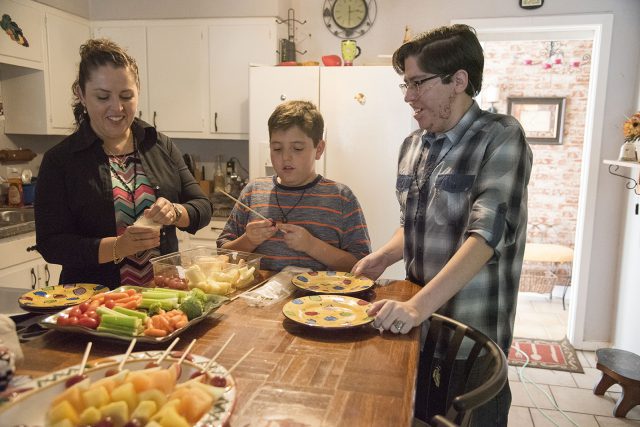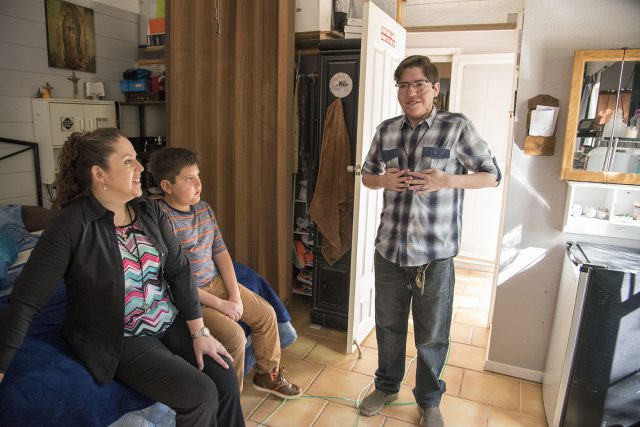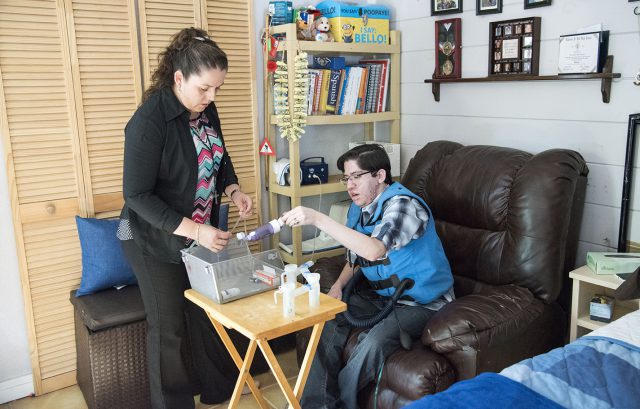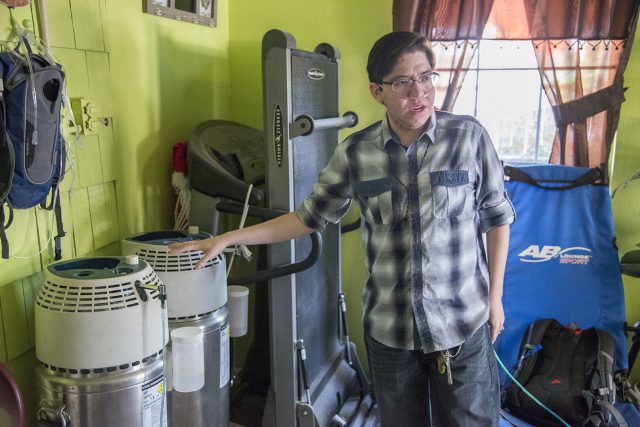By Kathryn Kelman/editor-in-chief
Former NE student urgently needs double lung transplant
Before he showers, eats or says good morning to his family, Victor Garcia moves from his bed to a chair, slips on a vest that pounds his chest and inhales his first breathing treatment of the day.
At the end of his day, after two other treatments, Garcia hooks himself up to a CPAP machine to help him keep breathing and a feeding tube that administers four bottles of formula to help him maintain his weight.
Garcia, a former TCC student, has reached a critical point in his battle with cystic fibrosis as his lung function has dropped to 18 percent. He needs a double lung transplant.
And now, he’s reaching out to the public for help.
Garcia started a GoFundMe page to raise money for the transplant because his insurance won’t cover it and his family can’t afford it. In a month, the page has raised over $5,000, and Garcia is grateful.
“It gives me a lot of hope — it’s a big thing,” Garcia said. “I know it’s hard to give to people you don’t know.”

Cystic fibrosis is an inherited condition caused by mutations in a single gene. The condition reduces a patient’s lifespan by causing the body to overproduce a thick mucus, which can lead to life-threatening lung infections. Symptoms vary and can include a cough, repeated lung infections and an inability to gain weight.
“My doctors told me when I was at 21 percent lung function, they said ‘You’re in that point where you need a lung transplant. It has to be now because later on if you get too sick, we won’t be able to do the surgery on you,’” Garcia said.
Garcia and his family turned to the insurance they obtained through the Children with Special Health Care Needs Services Program, but it doesn’t cover lung transplants.
“That’s when we started moving around and checked the Cystic Fibrosis Foundation and other insurance to see if I qualify for any of them, and I don’t,” he said. “We talked to hospitals to see if they could arrange something, but they said no.”
So that’s when Garcia and his family decided to open a GoFundMe account to raise money for the transplant.
“He asks him, ‘When you get your new lungs, you’ll be able to play soccer again? Do karate again?’”
Garcia doesn’t qualify for other insurance because he isn’t a U.S. citizen. He was born in Saltillo, Coahuila, Mexico. At the age of 2, he was diagnosed with cystic fibrosis and learned his battle to breathe would be a lifelong one, he said.
Over the years, his condition worsened. At the age of 10, his lung function was down to 17 percent, he said.
“The doctors told me the only way to keep living was to come to the U.S.,” Garcia said.

So, his parents sold everything they had and moved to North Texas, leaving behind their friends and family. Upon arriving in the U.S., Garcia went straight to Children’s Hospital in Dallas.
“I had to go straight to the ICU because I was in terrible condition,” he said. “I had 17 percent of my lung function, and the doctors didn’t think I could make it.”
But he did.
Garcia stayed in the intensive care unit for 2-3 weeks before being moved to the cystic fibrosis floor.
“Over the years, I was able to regain my lung capacity,” he said. “It went from 17 to 21 to 23 to 32.”
At one point, Garcia and his doctors got his lung function all the way up to 48 percent, he said.
“That was four years ago, but they found something else,” Garcia said.
In addition to cystic fibrosis, Garcia learned he had autoimmune hepatitis in his liver, he said. His doctors told him the only way to prevent it from doing more harm was to start him on immune suppressants, but helping his liver meant hurting his lungs. His body could no longer fight off the bacteria that infected and weakened them.
“So they gave me the immune suppressants, and I started getting sick more often,” Garcia said.
His liver function improved, but his lungs began to fail as he continued to get sick, he said.
“Everything went just downhill,” Garcia said.

Now Garcia goes to the hospital every three months for three weeks at a time to get antibiotics and more treatment. During that time, his family also spends much of their days there with him.
“As a mother, you don’t think about it,” said Tere Ramirez, Garcia’s mother. “It impacts his brother a little more.”
Ramirez and her husband both work to cover bills, but Ramirez gets home from work around 2 p.m. to be with her sons. When Garcia is in the hospital, she leaves work, picks up Emmanuel, Garcia’s little brother, and goes to the hospital.
“It’s really hard because we don’t have family here,” she said. “We have to do everything between us four.”
The family stays in constant communication by phone and tries to live as normally as they possibly can, Ramirez said.
“We have picnics on the patio and walk the dogs,” she said.
Garcia’s little brother is eager for him to have the transplant, Ramirez said.
“He asks him, ‘When you get your new lungs, you’ll be able to play soccer again? Do karate again?’” she said.
Two years ago, Garcia was more active. He was taking classes on NE Campus. But then he caught the flu, and his lungs couldn’t recover.
“After a long stay [at the hospital], I was prescribed the use of oxygen 24 hours a day,” he said.
He can no longer leave the house for more than three hours at a time, Ramirez said.
“If he goes outside, he’ll spend the next day in bed recovering,” she said.
Garcia said lung fatigue is really tough, especially the longer it’s been since his last hospital stay.
Garcia also struggles to find the energy to do basic activities at home.

“Because of my serious condition, my lungs run the risk of collapsing, which is why a double lung transplant is urgently needed,” Garcia said.
A lung transplant costs around $1 million, and his family doesn’t have the financial resources to pay for it, Garcia said. His GoFundMe page has a goal set at $750,000 in hopes that if they come up with most of the money, they can work something out with a hospital to make payments on the rest.
His page has been up for over a month and has raised over $5,000 in that time, but the momentum has slowed a lot.
Garcia hopes to get the transplant and go back to school to become a translator.
“I want to give back to the community that has given me so much as soon as I can,” he said.
His doctor warned him in case he gets sick and his heart fails, he had to choose what he wanted the doctors to do.
His doctor recommended Garcia not choose being resuscitated because he would have to be put on a ventilator, and patients on ventilators who are not candidates for transplant have a very poor quality of life, he said.
“So right now if I have a heart attack, I will not be resuscitated,” Garcia said. “Another reason why this is so urgent.”
To read more about Garcia’s story or to donate, go to:































